人教版初二英语知识点总结
初二英语下册知识点归纳人教版
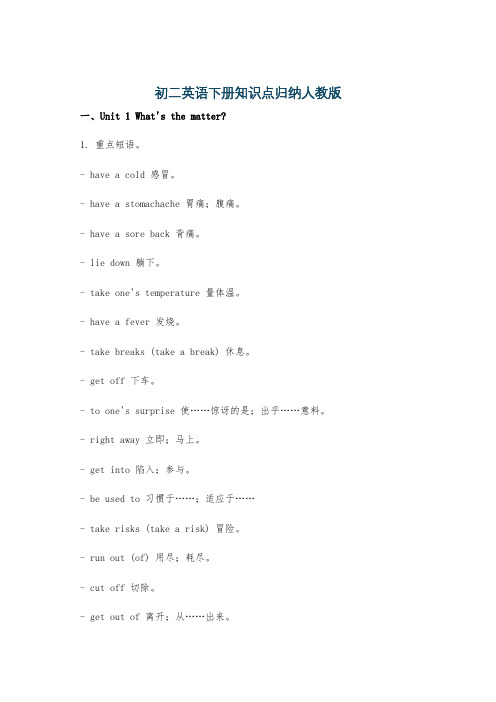
初二英语下册知识点归纳人教版一、Unit 1 What's the matter?1. 重点短语。
- have a cold 感冒。
- have a stomachache 胃痛;腹痛。
- have a sore back 背痛。
- lie down 躺下。
- take one's temperature 量体温。
- have a fever 发烧。
- take breaks (take a break) 休息。
- get off 下车。
- to one's surprise 使……惊讶的是;出乎……意料。
- right away 立即;马上。
- get into 陷入;参与。
- be used to 习惯于……;适应于……- take risks (take a risk) 冒险。
- run out (of) 用尽;耗尽。
- cut off 切除。
- get out of 离开;从……出来。
- be in control of 掌管;管理。
2. 重点句型。
- What's the matter? = What's wrong? = What's the trouble? 怎么了?- Should I put some medicine on it? 我应该在它(伤口)上敷些药吗?- You should lie down and rest. 你应该躺下休息。
- He hurt himself in P.E. class. 他在体育课上伤到了自己。
- Aron Ralston is an American man who is interested in mountain climbing. 阿伦·罗尔斯顿是一个对登山感兴趣的美国人。
3. 语法。
- 情态动词should的用法:should表示“应该”,用来提出建议或劝告,后接动词原形。
例如:You should see a dentist. 否定形式为shouldn't,例如:You shouldn't go to school late.二、Unit 2 I'll help to clean up the city parks.1. 重点短语。
人教版初二英语知识点总结
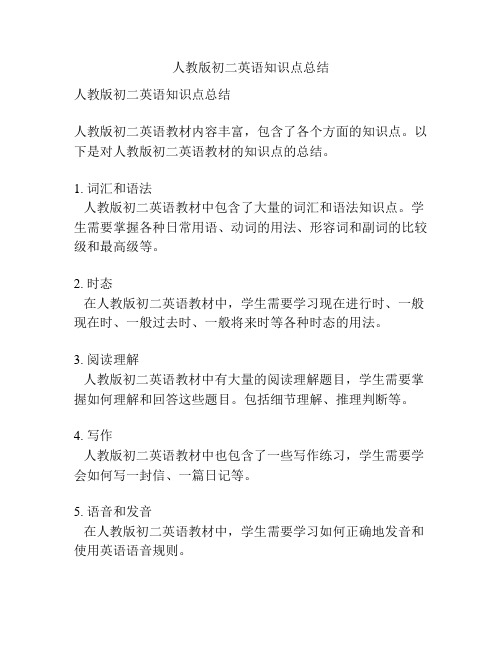
人教版初二英语知识点总结
人教版初二英语知识点总结
人教版初二英语教材内容丰富,包含了各个方面的知识点。
以下是对人教版初二英语教材的知识点的总结。
1. 词汇和语法
人教版初二英语教材中包含了大量的词汇和语法知识点。
学生需要掌握各种日常用语、动词的用法、形容词和副词的比较级和最高级等。
2. 时态
在人教版初二英语教材中,学生需要学习现在进行时、一般现在时、一般过去时、一般将来时等各种时态的用法。
3. 阅读理解
人教版初二英语教材中有大量的阅读理解题目,学生需要掌握如何理解和回答这些题目。
包括细节理解、推理判断等。
4. 写作
人教版初二英语教材中也包含了一些写作练习,学生需要学会如何写一封信、一篇日记等。
5. 语音和发音
在人教版初二英语教材中,学生需要学习如何正确地发音和使用英语语音规则。
6. 听力和口语
人教版初二英语教材中也包含了一些听力和口语训练,学生
需要通过这些练习来提高自己的听力和口语能力。
7. 实用的交际用语
人教版初二英语教材中也包含了一些实用的交际用语,学生
需要学会如何应对不同的交际场景。
8. 文化相关内容
人教版初二英语教材中也包含了一些与西方文化相关的内容,学生需要通过学习这些内容来了解不同的文化。
总的来说,人教版初二英语教材内容广泛,涵盖了各个方面的知识点。
学生需要通过不断的学习和练习来掌握这些知识点,提高自己的英语水平。
人教版初二英语语法知识点归纳总结(一)

人教版初二英语语法知识点归纳总结(一)人教版初二英语语法知识点归纳前言初中英语作为基础学科,在英语学习过程中,语法知识的掌握是非常重要的。
本文旨在总结人教版初二英语教材中的语法知识点,帮助广大学生和教师更好地掌握和应用这些知识,提高英语学习的效果和能力。
正文1. 一般现在时(Simple Present Tense)•表示经常性或习惯性的动作、状况或真理等•动词原形作主语时,要使用第三人称单数形式的动词(he, she, it)2. 一般过去时(Simple Past Tense)•表示过去某个时间发生的动作或存在的状态•一般过去时的句子中,动词使用过去式形式3. 一般将来时(Simple Future Tense)•表示将来某个时间将会发生的动作或存在的状态•一般将来时的句子中,使用将来时态的助动词“will”,或表示将来的其他词语,如“be going to”4. 现在进行时(Present Continuous Tense)•表示现在正在进行的动作或瞬间状态•现在进行时使用“be + 动词-ing”构成5. 过去进行时(Past Continuous Tense)•表示过去某个时间正在进行的动作•过去进行时使用“was/were + 动词-ing”构成6. 一般现在时与现在进行时的区别•一般现在时表示经常性或习惯性的动作或状态,现在进行时表示现在正在进行的动作或瞬间状态7. 一般过去时与过去进行时的区别•一般过去时表示过去某个时间的动作或状态,过去进行时表示过去某个时间正在进行的动作8. 一般现在时、一般将来时与一般过去时的比较•一般现在时表示经常性或习惯性的动作或状态,一般将来时表示将要发生的动作或状态,一般过去时表示过去某个时间的动作或状态结尾以上是人教版初二英语教材中的一些重要的语法知识点的归纳。
对于初中英语学习者来说,掌握这些语法知识是非常重要的,能够帮助他们正确理解和表达英语,提高语言水平,并且为进一步学习打下坚实的基础。
人教版初二英语上册知识点
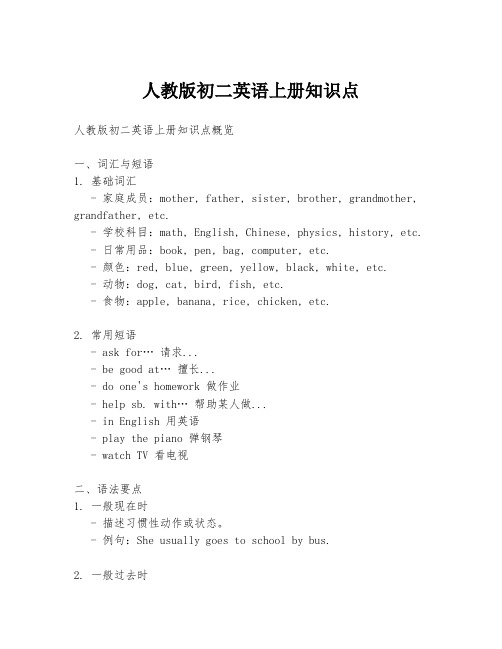
人教版初二英语上册知识点人教版初二英语上册知识点概览一、词汇与短语1. 基础词汇- 家庭成员:mother, father, sister, brother, grandmother, grandfather, etc.- 学校科目:math, English, Chinese, physics, history, etc. - 日常用品:book, pen, bag, computer, etc.- 颜色:red, blue, green, yellow, black, white, etc.- 动物:dog, cat, bird, fish, etc.- 食物:apple, banana, rice, chicken, etc.2. 常用短语- ask for… 请求...- be good at… 擅长...- do one's homework 做作业- help sb. with… 帮助某人做...- in English 用英语- play the piano 弹钢琴- watch TV 看电视二、语法要点1. 一般现在时- 描述习惯性动作或状态。
- 例句:She usually goes to school by bus.2. 一般过去时- 描述过去发生的动作或状态。
- 例句:They visited the museum last Saturday.3. 可数名词与不可数名词- 可数名词有单数和复数形式,不可数名词通常没有复数形式。
- 例句:There is some water in the bottle. (水是不可数名词)4. 代词- 主格代词:I, you, he, she, it, we, they- 宾格代词:me, you, him, her, it, us, them- 形容词性物主代词:my, your, his, her, its, our, their- 名词性物主代词:mine, yours, his, hers, its, ours,theirs5. 冠词- 不定冠词:a, an- 定冠词:the6. 介词- 表示时间:at, on, in- 表示地点:at, on, in, under, behind, etc.- 其他常用介词:with, for, from, of, etc.三、句型结构1. 简单句- 基本结构:主语 + 谓语 + 宾语- 例句:The boy plays football.2. 并列句- 连接词:and, but, or, so- 例句:She is young but very smart.3. 一般疑问句- 借助助动词do/does构成。
人教版初二英语语法知识点归纳总结
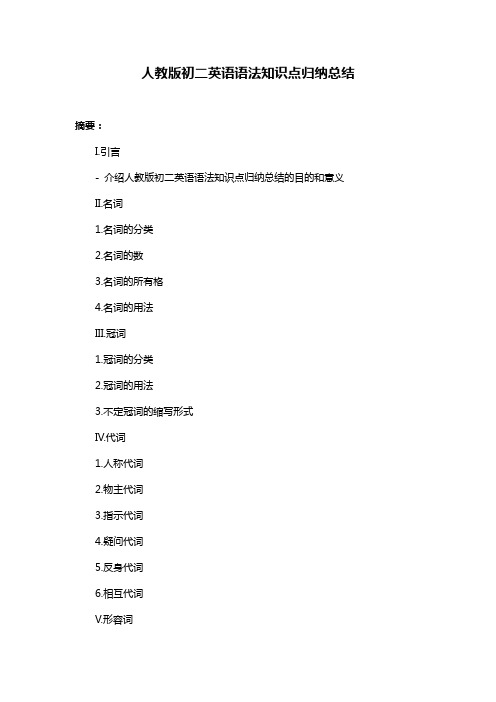
人教版初二英语语法知识点归纳总结摘要:I.引言- 介绍人教版初二英语语法知识点归纳总结的目的和意义II.名词1.名词的分类2.名词的数3.名词的所有格4.名词的用法III.冠词1.冠词的分类2.冠词的用法3.不定冠词的缩写形式IV.代词1.人称代词2.物主代词3.指示代词4.疑问代词5.反身代词6.相互代词V.形容词1.形容词的分类2.形容词的比较级和最高级3.形容词的位置和用法VI.副词1.副词的分类2.副词的比较级和最高级3.副词的位置和用法VII.动词1.动词的分类2.动词的时态3.动词的语态4.情态动词VIII.介词1.介词的分类2.介词的用法3.介词短语IX.连词1.连词的分类2.连词的用法X.句子结构1.陈述句2.疑问句3.祈使句4.感叹句XI.句型转换1.肯定句与否定句的转换2.一般疑问句与否定疑问句的转换3.祈使句与感叹句的转换XII.综合练习1.选择题2.填空题3.改错题4.翻译题正文:英语语法是英语学习的基础,对于初学者来说,掌握英语语法显得尤为重要。
本文将针对人教版初二英语教材中的语法知识点进行归纳总结,以帮助同学们更好地学习和掌握英语语法。
一、名词名词是表示人、事物、地点或抽象概念的词语。
在初二英语学习中,我们需要掌握名词的分类、名词的数、名词的所有格以及名词的用法。
例如,名词可分为可数名词和不可数名词;名词的数可分为单数和复数等。
二、冠词冠词是英语语法中一个重要的词类,用于表示名词所指的人或物的特定性质。
在初二英语学习中,我们需要掌握冠词的分类、冠词的用法以及不定冠词的缩写形式。
例如,定冠词“the”表示特指,不定冠词“a/an”表示泛指等。
三、代词代词是用来替代名词的词,可以避免重复使用同一个名词。
在初二英语学习中,我们需要掌握人称代词、物主代词、指示代词、疑问代词、反身代词以及相互代词。
例如,人称代词有“我、你、他、她、它、我们、你们、他们”等。
四、形容词形容词用于修饰名词,表示人、事物或抽象概念的性质、状态或特征。
初二人教版英语知识点归纳总结

初二人教版英语知识点归纳总结英语是一门广泛使用的国际语言,对于我们来说学好英语是非常重要的。
作为初中生,我们要掌握基础的英语知识点,扎实地提升自己的英语水平。
下面我们来归纳总结初二人教版英语的知识点。
一、语法知识点1. 时态:英语中有多种时态,如一般现在时、一般过去时、一般将来时等。
要掌握各种时态的构成和用法。
2. 动词:包括动词的基本形式、时态变化、非谓语动词的形式和用法等。
3. 名词:包括可数名词和不可数名词的区别,名词的复数形式等。
4. 代词:包括人称代词、物主代词、反身代词的用法。
5. 形容词和副词:形容词和副词的用法,以及比较级和最高级的构成和用法。
6. 冠词:冠词的用法和区别,如定冠词和不定冠词的使用。
7. 介词:介词的用法和搭配,如表示时间、地点、方式等。
8. 疑问句和否定句:疑问句和否定句的构成和用法。
二、词汇知识点1. 常用词汇:常用的英语单词,如数字、颜色、日期、季节、职业等。
2. 词组和固定搭配:常用的英语词组和固定搭配,如“take care of”、“look forward to”等。
3. 同义词和反义词:同义词和反义词的辨析和用法。
4. 常见的词根、前缀和后缀:常见的词根、前缀和后缀的意义和应用。
三、阅读技巧1. 阅读理解:掌握阅读理解的技巧,如快速浏览文章,关注关键词等。
2. 阅读策略:了解如何根据上下文推测词义,理解句子结构和篇章结构。
3. 阅读速度和准确性:培养良好的阅读习惯,提高阅读速度和准确性。
四、写作技巧1. 句子结构:掌握不同类型的句子结构,如简单句、并列句、复合句等。
2. 连接词的使用:了解连接词的用法,如and、but、because等。
3. 写作思路和组织:学会合理组织文章结构,包括引言、主体和结论。
4. 语法准确性和词汇丰富性:注意语法的准确性和词汇的丰富性,使文章更加生动和有说服力。
五、口语表达1. 日常用语:学会日常交流中的常用口语表达,如问候、道歉、邀请等。
初二英语知识点人教版
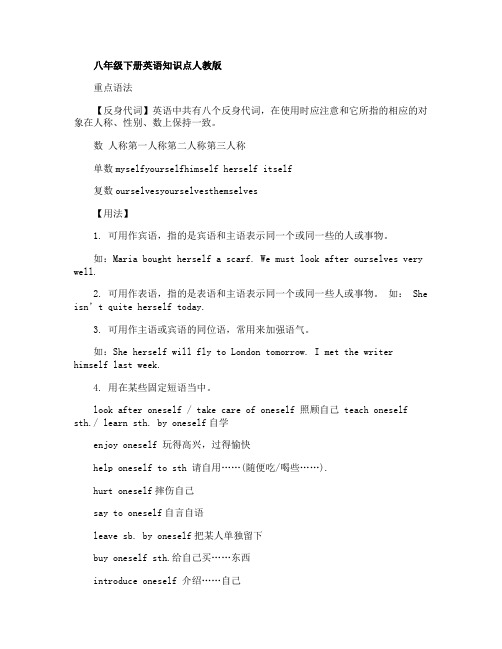
八年级下册英语知识点人教版重点语法【反身代词】英语中共有八个反身代词,在使用时应注意和它所指的相应的对象在人称、性别、数上保持一致。
数人称第一人称第二人称第三人称单数myselfyourselfhimself herself itself复数ourselvesyourselvesthemselves【用法】1. 可用作宾语,指的是宾语和主语表示同一个或同一些的人或事物。
如:Maria bought herself a scarf. We must look after ourselves very well.2. 可用作表语,指的是表语和主语表示同一个或同一些人或事物。
如: She isn’t quite herself today.3. 可用作主语或宾语的同位语,常用来加强语气。
如:She herself will fly to London tomorrow. I met the writer himself last week.4. 用在某些固定短语当中。
look after oneself / take care of oneself 照顾自己 teach oneself sth./ learn sth. by oneself自学enjoy oneself 玩得高兴,过得愉快help oneself to sth 请自用……(随便吃/喝些……).hurt oneself摔伤自己say to oneself自言自语leave sb. by oneself把某人单独留下buy oneself sth.给自己买……东西introduce oneself 介绍……自己八年级上册英语知识点归纳人教版1.Did you see any cows?你看见奶牛了吗?Yes,I did.I saw quite a lot.是的,我看见了许多。
2.Did you ride a horse?你骑马了吗?No,I didn’t.But I milked a cow.不,我没有,但我挤牛奶了。
人教版初二英语语法知识点归纳总结

人教版初二英语语法知识点归纳总结一、名词名词是指表示人、事物、动物、植物和抽象概念等的名称。
在语法中,名词作为句子的主语、宾语、表语和定语等。
1. 可数名词和不可数名词可数名词有单数和复数形式,可以用数目来计算,如book(书)- books(书们),child(孩子)- children(孩子们)等。
而不可数名词则没有复数形式,不能用数目来计算,如water(水)、milk(牛奶)等。
2. 名词所有格名词所有格表示所属关系,一般在名词后面加's,如Tom's bag(汤姆的书包)。
二、冠词冠词是用来修饰名词的词语,分为定冠词和不定冠词。
1. 定冠词定冠词有三种形式:the、this、that,用于特指某一人或事物。
例如,the book(这本书)。
2. 不定冠词不定冠词有两种形式:a和an,用于泛指一类人或事物。
例如,a book(一本书)。
三、代词代词是用来代替名词的词语。
根据在句子中的作用,可以分为人称代词、物主代词、指示代词和不定代词等。
1. 人称代词人称代词分为主格和宾格两种形式。
主格代词:I(我)、you(你)、he(他)、she(她)、it(它)、we(我们)、they(他们)等。
宾格代词:me(我)、you(你)、him(他)、her(她)、it (它)、us(我们)、them(他们)等。
2. 物主代词物主代词表示所属关系,分为形容词性物主代词和名词性物主代词。
形容词性物主代词:my(我的)、your(你的)、his(他的)、her(她的)、its(它的)、our(我们的)、their(他们的)等。
名词性物主代词:mine(我的)、yours(你的)、his(他的)、hers(她的)、ours(我们的)、theirs(他们的)等。
3. 指示代词指示代词用来指示人或事物的位置、距离等关系,包括this(这个)、that(那个)、these(这些)、those(那些)等。
- 1、下载文档前请自行甄别文档内容的完整性,平台不提供额外的编辑、内容补充、找答案等附加服务。
- 2、"仅部分预览"的文档,不可在线预览部分如存在完整性等问题,可反馈申请退款(可完整预览的文档不适用该条件!)。
- 3、如文档侵犯您的权益,请联系客服反馈,我们会尽快为您处理(人工客服工作时间:9:00-18:30)。
人教版初二英语知识点总结初二(上)【知识梳理】I. 重点短语1. on time2. best wishes3. give a talk4. for example5. short for6. a waste of time7. go on a field trip8. go fishing9. I agree 10. next week 11. the day after tomorrow 12. have a picnic 13. have some problems doing sth. 14. go the wrong way 15. hurry up 16. get together 17. in the open air 18. on Mid-Autumn Day 19. come over 20. have to 21. get home 22. agree with 23. in the country 24. in town25. all the same 26. in front of 27. on the left/right side 28. next to 29. up and down 30. keep healthy 31. grow up 32. at the same time33. the day before yesterday 35. last Saturday 36. half an hour ago 37. a moment ago 》38. just now 39. by the way 40. all the time 41. at firstII. 重要句型1. have fun doing sth.2. Why don’t you…3. We’re going to do sth.4. start with sth.5. Why not…6. Are you going to…7. be friendly to sb. 8. You’d better do sth.9. ask sb. for sth. 10. say goodbye to sb.11. Good luck(with sb)!`III. 交际用语backto school! 2. It doesn’t matter.3.E xcuse me. I’m sorry I’m late, because the traffic is bad.Teachers’ Day !’s a good idea.are you going to do are we goingare we going to do ’m good at…’s not far from…11. Are you free tomorrow eveningyou and Lily like to come over to my home for Mid-Autumn Festival,’m glad you can come.for asking us.about another one I have a tasteme walk with you. do you have to doyou live on a farm do you like better, the city or the countrydo you like best, dogs, cats or chickenswe go at ten Good idea! ’s make it half past one. ---OK.not come a little earlier ---All right.me. Where’s the nearest post office, please—’s over there on the right.’m sorry I don’t know.’d better…you all the same.bus do I take along this road.day was it yesterday’m sorry to hear that.hope you’re better now.did you call me called to tell…IV. 重要语法going to的用法; 2.形容词的比较级、最高级;3.形容词和副词的比较4.一般过去时初二年级(中)【【知识梳理】I. 重点短语1. give a concert2. fall down3. go on4. at the end of5. go back6. in ahurry7. write down8. come out9. all the year round10. later on11. at times12. ring sb. up13. Happy New Year!14. have a party15. hold on16. hear from17. be ready18. at the moment19. take outsame as21. turn over22. get-together23. put on24. take a seat25. wait for26. get lost27. just then28. first of all29. go wrong30. make a noise31. get on32. get off33. stand in line 34. at the head of35. laugh at36. throw about37. in fact38. at midnight39. enjoy oneself40. have a headache41. have a cough42. fall asleep43. again and again44. look over45. take exerciseII. 重要句型1. be good for sth.2. I think …3. I hope…4. I love…5. I don’t like…6. I’m sure…7. forget to do sth.8. take a message for sb.9. give sb. the message10. help yourself to sth.11. be famous for sth.12. on one’s way to…13. make one’s way to…14. quarrel with sb.15. agree with sb.16. stop sb. from doing sth. III. 交际用语’s the weather like today’s cold, but quite suuny. cold it is today!, but it’ll be warmer later on. we make a snowman. Come on!New Year!I speak to Ann, pleaseon, please.a lot for inviting me to your party.. But I’m afraid I may be a little late.I take a message for you’s OK. It doesn’t matter.’m very sorry, but I can’t come.’m sorry to hear that.birthday!you like ... Would you like to ...you think ... Yes, I think so. / No, I don't think so.you agree Yes, I agree. / No, don't really agree. I really can't agree.are a few / a lot of ... / on it.do we.'m happy you like it.is the way to ..., pleaseright/left at the ... crossing.on until you reach ...can I get to ... Go down/up/along this road. 's the matter'll take you half an hour to ...'d better catch a bus.may be in ... Ah, so it ismust be more careful!mustn't cross the road now.you want to cross a street, you must wait for the green light.stand in line.must wait for your turn.you don't go soon, you'll be late.don't feel very well.head hurts.mustn't eat anything until you see the doctor.'s the trouble's the matter with…didn't feel like eating anything.serious.get a pain in…problem.this medicine three times a day.IV. 重要语法1. 一般过去时;2. 反意疑问句的用法;3. 一般将来时;4. 感叹句;5. 简单句的五种基本句型;6. 情态动词can, may和must, have to的用法;7. 时间状语从句和条件状语从句。
初二英语(下)【知识梳理】I. 重点短语1. on time2. out of3. all by oneself4. lots of5. no longer6. get back7. sooner or later8. run away9. eat up10. take care of11. turn off12. turn on13. after a while14. make faces15. teach oneself16. fall off17. play the piano18. knock at19. to one's surprise20. look up21. enjoy oneself22. help yourself23. tell a story / stories24. leave....behind ……25. come along26. hold a sports meeting27. be neck and neck28. as ... as29. not so / as ... as30. do one's best31. take part in32. a moment late33. Bad luck!34. fall behind35. high jump36. long jump37. relay race38. well done!39. take off40. as usual41. a pair of42. at once43. hurry off44. come to oneself45. after a while46. knock on47. take care of48. at the moment49. set off50. here and there51. on watch52. look out53. take one’s placeII. 重要句型1. We’d better not do sth.2. leave one. oneself3. find one’s way to a place4. stand on one’s head5. make sb. Happy6. catch up with sb.7. pass on sth. to somebody8. spend time doing sth.9. go on doing sth.10. get on well with sb.11. be angry with sb.12. be fed up with sth.13. not…until…14. make room for sb.III. 交际用语1. We’re all by ourselves.2. I fell a little afraid.3. Don’t be afraid.4. Help!5. Can’t you hear anythi ng6. I can’t hear anything / anybody there.7. Maybe it’s a tiger.8. Let’s get it back before they eat the food.9. Did she learn all by herself10. Could she swim when she was …years old11. She didn’t hurt herself.12. He couldn’t buy himself many nice things.13. Did he enjoy himself14. Help yourselves.15. Bad luck!16. Come on!17. Well done! Congratulations (to…)!18. It must be very interesting.19. I don’t think you’ll like it.20. It seems to be an interesting book.21. I’m sure (that)… I’m not sure if… I’m not sure what to…22. I hope so.23. What was he/she drawing when…24. I’m sorry to trouble you.25. Would you please…26. What were you doing at ten o’clock yesterday morning27. You look tired today.28. You’d better go to bed early tonight, if you can.29. How kind!30. Let’s move the bag, or it may cause an accident.31. It’s really nice of you.32. Don’t mention it.33. Don’t crowd around him.IV. 重要语法1. 不定代词/副词的运用;2. 反身代词的用法;3. 并列句;4. 形容词和副词的比较等级;5. 冠词的用法;`。
